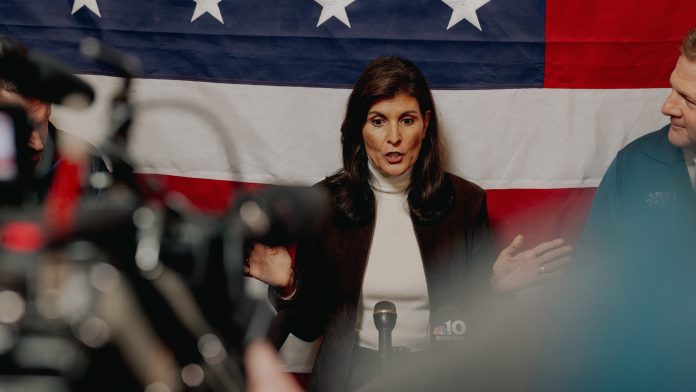Photographs by Cody O’Loughlin
This article was featured in the One Story to Read Today newsletter. Sign up for it here.
N
ikki Haley was standing a few feet in front of me on a warm December night in New Hampshire. She had just finished a town-hall event at a Manchester ski lodge, from which no snow was visible for miles except the manufactured white stuff coating a sad little hill outside.
Presidential candidates often try to conjure a sense of momentum around their campaign, and Haley’s had been accumulating the key elements: rising poll numbers, crowd sizes, and fundraising sums. Her ascendancy began around Thanksgiving, an unofficial benchmark for when voters supposedly tune in to primary campaigns. Among many of them, the former South Carolina governor and United Nations ambassador had become a source of intrigue: Could she actually win? Or was she merely the latest contender to lead a post–Donald Trump Republican Party that never arrives?
I was in New Hampshire to gauge the extent of this apparent upsurge. Of all the campaign events in the past year—except Trump’s, which occupy their own category—Haley’s have been the most commanding. She has run the best race against Trump out of a motley bunch of Republicans—far better than former Vice President Mike Pence and South Carolina Senator Tim Scott, both long gone; Vivek Ramaswamy, whose yapping provocations gained him early notoriety but grated fast; and especially Florida Governor Ron DeSantis, who squandered his early status as Trump’s main challenger—and massive amounts of cash—by turning out to be a colossal dud of a candidate. (“Like a wounded bird falling from the sky,” Trump said of DeSantis, an overlooked but fascinatingly poetic assessment.)
On this night in Manchester, I watched Haley pound out a stump speech about how, among other things, her main achievement as UN ambassador was to take “the kick-me sign off of our backs.” And how “our kids need to know to love America.” And how she was determined to “humanize” the fractious issue of abortion and, rest assured, “the days of demonizing that issue are over.”
Haley is a gifted political performer, particularly in a certain kind of room. This was one of those, a politely boisterous gathering of a few hundred people, serious and professional, many still dressed for work. She came off as reasonable and solicitous, holding the same authority as she did at the various Trumpless debates she has rated so well in. You can see how Haley could rise to the level she has, the most formidable alternative to Trump or (if you prefer) first among the Republican also-rans.
[Read: Nikki Haley offers an alternate reality]
After completing her set remarks to a standing ovation, Haley took audience questions, greeted a 30-minute lineup of supporters, and satisfied their various selfie and autograph needs, nailing eye contact, small talk, and drive-by rapport. “She understands that kind of customer-service approach,” New Hampshire Governor Chris Sununu raved to me after telling the Manchester crowd that he was endorsing Haley. (“You bet your ass I am!”)
At the end of the night, Sununu stood to Haley’s left as she faced a clot of television cameras and microphones and shouted questions from reporters. She is good at this too—parrying pointed inquiries with self-assurance, then moving on before anyone can really reflect on what she said, or didn’t say.
But Haley’s sturdy pronouncements belie a certain wobbliness. Wait, what did she say exactly?
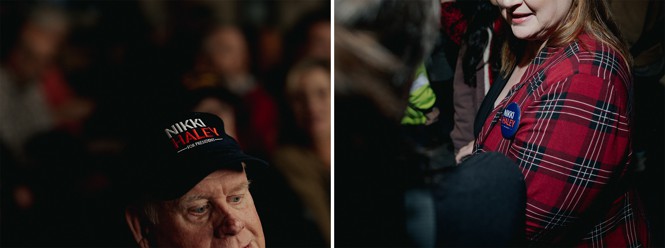
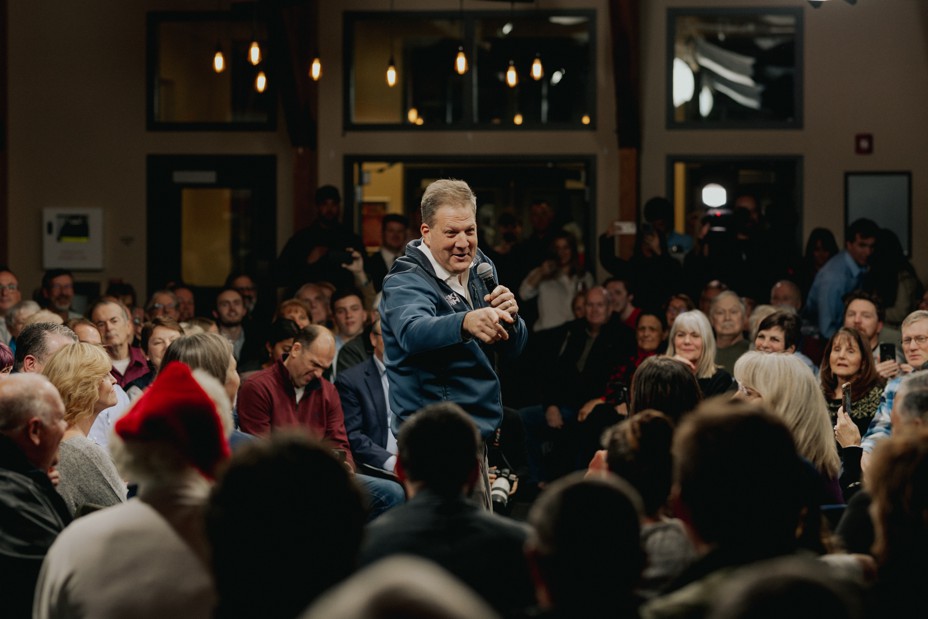
Beyond her expertly rendered deliveries, Haley’s actual answers can be mushy or even nonsensical, with strange constructions and frequent malaprops. In Manchester, Haley praised Sununu for having his “pulse to the ground” in his state and boasted that her campaign already had momentum before his endorsement “just gave it a speed bump.” At a November debate, she ordered Ramaswamy to “leave my daughter out of your voice” (as opposed to her daughter’s name out of his mouth). “We have to deal with the cancer that is mental health,” she declares in her town halls when the subject arises (mental health, not cancer).
Later in the session, a reporter asked Haley about Trump’s then-most-recent flare-up, his statement to Sean Hannity that he would be a dictator “on day one,” long since overshadowed by Trump’s “rot in Hell” Christmas message and his claim that immigrants are “poisoning the blood of our country.” In the moment, the “dictator” comment did feel germane, as did the question to Haley about whether that should perhaps preclude him from leading the world’s most powerful democracy.
“First of all, that’s for the voters to decide,” Haley declared, “if they want a dictator on day one.”
Yes, unquestionably. But what about Haley, the candidate we were speaking to—what did she decide?
“I’m not going to be a dictator on day one,” she assured everyone, not answering.
“I’ve always spoken in hard truths” is one of Haley’s trademark claims. In reality, the bluntness she discharges is reserved mostly for easy targets: the media, President Joe Biden, and “Kamala” (first name only, per GOP style). When it comes to speaking the hardest Republican truths of all—about Trump—Haley’s words fall feebly (wounded-bird-like), and her voice acquires a slightly halting tone and slower cadence.
Her preferred pose is one of pronounced exasperation. “Anti-Trumpers don’t think I hate him enough; pro-Trumpers don’t think I love him enough,” Haley said at the press gaggle. She shook her head and flashed a Man, I just can’t win look before escaping into a smoke screen of platitudes (“at the end of the day, I just put my truths out there and let the chips fall where they may”).
For all her cultivated brashness, Haley, whose campaign declined my requests to interview her, can also convey an impression of being terrified—of saying the wrong thing, of offending too many MAGA or MAGA-adjacent voters, or certainly of Trump himself.
The most excruciating example of this occurred a few days after Christmas, when a New Hampshire voter asked Haley to explain why the Civil War was fought. She provided a stem-winder of vague conservative assertions (“government doesn’t need to tell you how to live your life”) while omitting the obvious cause: slavery. She appeared to be sensitive to the fact that some Americans might be sick of being reminded about the nation’s shameful, bloody history. Haley, who as governor removed the Confederate flag from the South Carolina statehouse, has said that as president she would not play into the “national self-loathing” that she is always lamenting, “this idea that America is bad, or rotten, or racist.”
But trying to talk about the Civil War without mentioning slavery is like trying to run for the Republican nomination in 2024 while barely touching the all-encompassing, front-running figure at the center of it all.
One of Haley’s niftier moves occurs later in her stump speech, when she builds to a seemingly dramatic revelation.
“I think President Trump was the right president at the right time,” she reassures her audience. It is an imprecise and puzzling statement—what “time” exactly? (Charlottesville? COVID?) But Haley delivers the line with a force that sets a few heads bobbing in the crowd and leads her safely into her next credential. “I had a good working relationship with him when I was in his administration,” she further affirms.
“But …”
The words that follow this inevitable but are as fraught as any that a Republican candidate can utter. Say something like “He’s becoming crazier,” as former New Jersey Governor Chris Christie did of Trump last month, and you might win candor points but probably not any Republican primaries.
[David A. Graham: Chris Christie, liberal hero]
Haley’s next line barely deviates a word, speech to speech: “Rightly or wrongly, chaos follows him.” You could construct a tidy diagram to illustrate the perfect passivity she achieves here. Haley assigns no judgment (“rightly or wrongly”) and makes no suggestion that Trump might have ever said or done anything that actually caused this “chaos”—a euphemism for, say, the events of January 6 or whatever else is embedded in those 91 criminal counts. All of this “chaos” somehow comes randomly to rest upon the 45th president.
“Chaos follows him,” Haley said again at a December 14 town hall in the southern–New Hampshire town of Atkinson. “You know I’m right” was the extent of her elaboration.
“It just does.”
Haley’s soft landing at “chaos follows him” comes after a zig-zagging and sometimes turbulent journey with Trump. The odyssey began during the 2016 campaign, when Haley called him “scary” and the embodiment of “everything we teach our kids not to do in kindergarten.” She endorsed Senator Marco Rubio—like Haley, a child of immigrants—by saying she was excited to support a candidate who “was going to go and show my parents that the best decision they ever made was coming to America.”
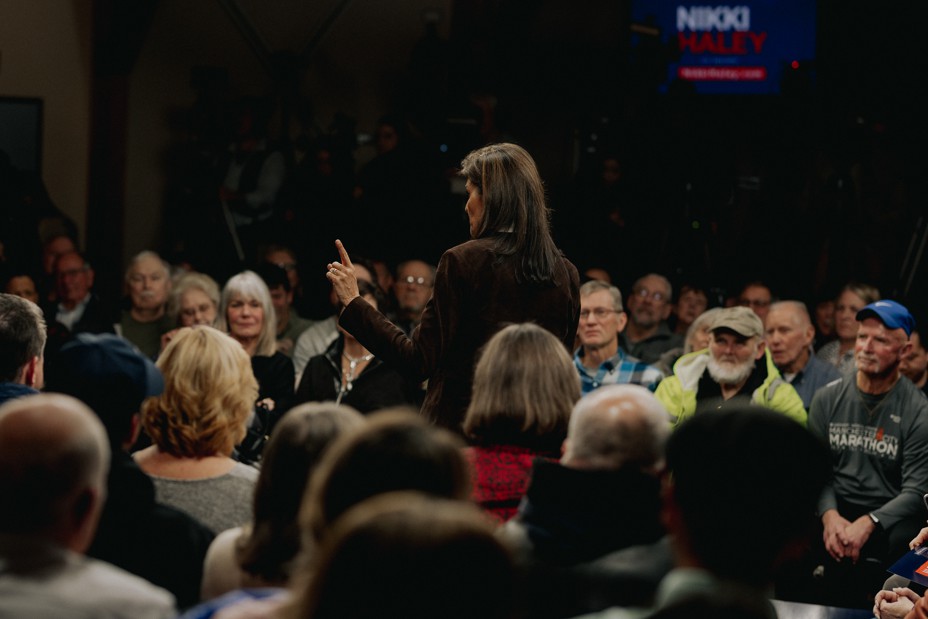
After Trump won the Republican nomination, Haley said, reluctantly, that she would vote for him. Trump asked her to serve as his ambassador to the United Nations reportedly as a favor to South Carolina’s lieutenant governor, Henry McMaster, a big Trump supporter, who wanted Haley out of the way so he could become governor. The UN job allowed Haley to burnish her foreign-policy résumé, and being in New York kept her removed from the daily discord of Trump’s White House. She served until 2018. “I got out of the administration without a tweet,” she likes to say.
Following Trump’s 2020 defeat and the January 6 insurrection, Haley sounded eager to bury her former boss and get on with her pursuit of his job. “His actions since Election Day will be judged harshly by history,” she declared in a January 7 speech at a Republican National Committee meeting. Haley said there was no chance Trump would ever run for federal office again. When those predictions proved premature, she reportedly tried to pay a quick make-up visit to Mar-a-Lago but was told by the proprietor not to bother. Less than three weeks after the insurrection, she told the Fox News host Laura Ingraham that everyone should “give the man a break.”
That April, Haley promised that she would support Trump if he ran for president again in 2024. And if he did, she said, she would not run herself.
Until … never mind.
As a candidate, Haley, whom Trump has taken to calling “Birdbrain,” frequently mentions how much better she would fare against Biden than Trump or DeSantis would. She often cites a Wall Street Journal poll from last month that shows her leading Biden by 17 points in a head-to-head matchup (Trump wins by four points). No doubt “electability” is a compelling argument, but this hypothetical Haley blowout is also premised on a dubious assumption—that Trump would be a gracious loser and urge his supporters to vote for their Republican standard-bearer, Ambassador Birdbrain.
When it comes to Trump’s indictments, Haley can’t bat away questions fast enough. “A lot of these cases have been politicized, we all know that,” she said in Manchester. Haley has promised to support the GOP nominee, whether it’s Trump or someone else. And in Plymouth, New Hampshire, at the end of December, she said that if she were elected president and Trump were convicted, she would likely pardon him “so that we can move on as a country and no longer talk about him.”
Such flaccid scolding is of course a big part of why Trump is still here. Appeasement has been the Republican business model since 2015. “It’s like what happened last time—nobody wanted to criticize Trump,” Mark Sanford, a former Republican representative from and governor of South Carolina, told me. Sanford, who declined to speak about Haley on the record, lost his 2018 House primary after becoming a strident Trump critic. “They figured he would go away,” Sanford said, referring to Trump’s Republican opponents over the years. “And they sort of waited and waited and waited, and he didn’t go away.”
Eight years later, Haley seems to be of a similarly passive mindset: put up tepid resistance to Trump, at least early on; stay alive; and hope that someone, or something, comes along to take care of the problem. “Maybe she catches a break from a jury,” Chip Felkel, a longtime Republican strategist in South Carolina told me, referring to the possibility of Trump being convicted in the coming months. Felkel, who is not affiliated with Haley’s campaign, says that he’s no fan of hers but that he’s hugely hostile to Trump, so he’ll support his former governor.
Chris Christie offers a different specimen of Trump alternative: a former friend and longtime ally of the 45th president whose unambiguous denunciations were the centerpiece of his campaign. Christie has held back little, calling Trump a “coward,” a “fool,” and a “self-centered, self-possessed, self-consumed, angry old man.”
In other words, Christie has been the rare candidate willing to tell actual hard truths about Trump. He will also not be the Republican nominee: He suspended his campaign last night.
Will Haley be the nominee? Are her pillowy “attacks” on the front-runner simply the undignified price of Republican viability today? Has this approach at least given her the best shot of any Republican to defeat Trump—an extremely long shot, but a shot nonetheless?
Her theory of the race is straightforward enough: Beat DeSantis for second in Iowa; be competitive with Trump in New Hampshire, where she’s gained in recent polls but still trails by double digits in most; and then parlay that momentum into defeating Trump in her home state (where the former president also remains well ahead).
Both Christie and Haley are pragmatic former governors who appeal to independents and college-educated moderates. Polling this past fall showed that a significant portion of his backers in New Hampshire would migrate to Haley if he bowed out of the race before the state’s January 23 primary.
A week before Christmas, Christie faced growing public pressure, much of it from people backing Haley, to drop out in the name of stopping Trump. The former New Jersey governor had made a sustained and effective case against Trump over several months, but struggled to boost his support into the teens and was strongly considering it.
But he held off for a few weeks. Christie has been frustrated, even appalled, by Haley’s unwillingness to say how she really feels about Trump, according to sources close to Christie. He has become less and less shy about expressing his dissatisfaction with her in public. He has taunted Haley for not ruling out a role as Trump’s running mate, as he and DeSantis have. “I don’t play for second” has been Haley’s standard answer to the vice-presidential question, an emphatic non-denial. “That’s why she’s not saying strong things against Donald Trump,” Christie said on Face the Nation.
[Jonathan V. Last: Nikki Haley’s endgame]
His reaction to Haley’s slavery misadventure was especially pointed. “She’s unwilling to offend anyone by telling the truth,” he said in Epping, New Hampshire. “It’s worse to be able to be dishonest with people, and that’s what’s happening here.”
Now that Christie’s out of the primary, Haley will surely get some of his voters, though an endorsement seems unlikely anytime soon. Shortly before Christie announced his exit last night, at a town hall in New Hampshire, a hot mic caught him saying of Haley: “She’s gonna get smoked … She’s not up to this.”
Christie’s quandary over Haley is one that many Trump-skeptical Republicans identify with. “It’s the Nikki Haley dilemma,” Mike Murphy, a longtime Republican media consultant who has deep loathing for Trump and would love to see him lose, told me. He finds Haley’s cynicism depressing and is disgusted by her willingness to pander to “the latest insipid GOP crowd-pleasing trope,” as he recently wrote on Substack.
“Still, compared to Trump, she’s Gandhi,” Murphy continued. And he thinks she has a real chance to beat Trump in New Hampshire, where Murphy helped John McCain upset George W. Bush in 2000. “If I lived in New Hampshire, I’d vote for Haley in a heartbeat,” he told me.
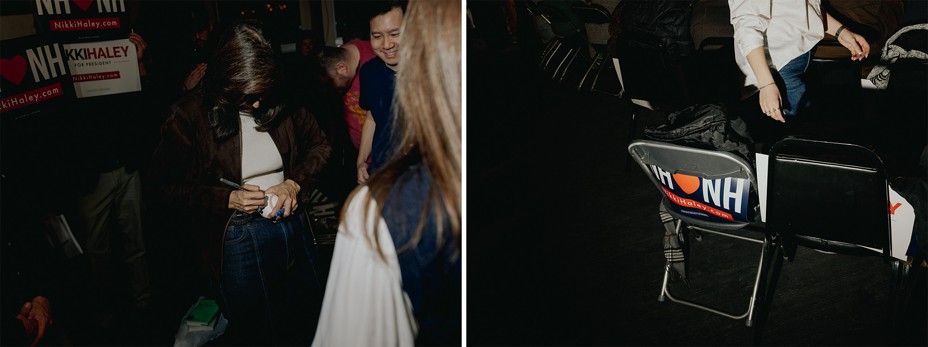
Haley’s knack for connecting one-on-one with voters does not always extend to political peers. On the contrary, her career has featured an array of disposable alliances, stubborn grudges, and a sense of paranoia about opponents, as my colleague Tim Alberta, then of Politico, documented in a 2021 profile of Haley. “She cut me off,” Sanford told Alberta. “This is systematic with Nikki,” he continued. “She cuts off people who have contributed to her success. It’s almost like there’s some weird psychological thing where she needs to pretend it’s self-made.”
“I don’t trust, because I’ve never been given a reason to trust,” Haley told Alberta. “Friend,” she added, “is a loose term.” She is fond of saying she wears heels not as a fashion statement but “for ammunition.”
No doubt Haley comes to this worldview honestly, having grown up as an Indian American in the Deep South of the 1970s and ’80s. She has faced discrimination, racism, sexism, and smears—not subtle ones, either. When she ran for governor, in 2010, a South Carolina political blogger and a lobbyist working for one of Haley’s rivals in the race both claimed to have had affairs with Haley (she denied them), and a Republican state senator called her a “raghead.”
“Every South Carolina politician here has been through that, all of us,” Katon Dawson, the former chair of the South Carolina GOP and a Haley supporter, told me. “We’re from South Carolina, and it is a bare-knuckled brawl.”
For Haley to win, Felkel, the South Carolina strategist, said he thinks she will have to channel some of that South Carolina pugilism and “open up a can of whoop-ass” on Trump. “We need to see more stiletto weaponry from her, and less ‘bless your heart,’” Felkel said.
In recent days, Haley has taken a somewhat more combative tack against Trump, after a pro-Trump super PAC released a campaign ad in New Hampshire that accused her of supporting a gas-tax increase in South Carolina and dubbed her “‘High Tax’ Haley.” (Haley had backed a gas-tax hike coupled with an income-tax cut.) “In his commercials and in his temper tantrums, every single thing that he’s said has been a lie,” she told an audience at a January 2 town hall on the New Hampshire coast.
“So if he’s gonna lie about me,” Haley went on, “I’m gonna tell you the truth about him.” The line drew the biggest applause of the event. Haley delivered it slowly, clearly, and with authority—like a candidate to be reckoned with, who might just be willing to escalate things.
But wasn’t Haley supposedly telling “hard truths” all along? Isn’t that kind of her signature thing? “She’s admitting that her retaliation to Trump’s lying about her is that she will stop lying about him,” Jonathan V. Last wrote in The Bulwark. Last dubbed Haley’s line “the most complete exposure to a politician’s subconscious I’ve ever seen.”
Or maybe this was always Haley’s conscious plan—to gradually parcel out her clever “hard truths” if convenient and when openings arise, and impress the right people and donors while doing so. Perhaps Haley already views this foray as a success. Even if she never seriously threatens Trump, she’s likely to perform respectably in the early states, win a second place or two, outlast DeSantis, and land some breezy swipes at Trump. Then, when his nomination becomes inevitable again, she can safely endorse her old boss (they always had a good working relationship!) and move on to her next campaign, to be Trump’s vice president or to try again in 2028.
Related Podcast
Listen to Mark Leibovich discuss Nikki Haley on Radio Atlantic:
Subscribe here: Apple Podcasts | Spotify | YouTube | Google Podcasts | Pocket Casts
















